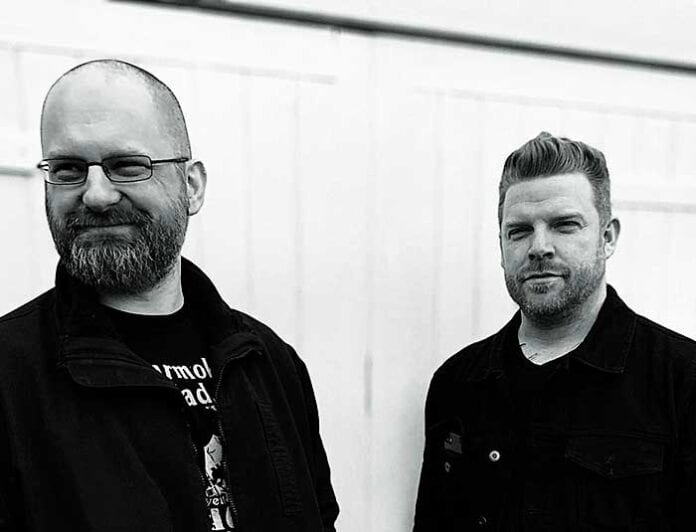
INTERVIEW WITH DAVE HUNT (V.I.T.R.I.O.L.)
BY GEORGE PACHECO
COLOR PHOTOGRAPHS BY MARIE KORNER
Intense. There are a number of adjectives one could use to describe Britain’s Anaal Nathrakh, but this one just seems to fit like an iron glove. In fact, there’s been plenty of ink spilt about this duo of vocalist Dave Hunt (V.I.T.R.I.O.L.) and instrumentalist/drum programmer/songwriter Irrumator, also known by the human name of Mick Kenney, from their raw black metal origins to the chaotic and grinding riff machine they are today.
The band has been remarkably consistent, as well, evolving but remaining extreme, from The Codex Necro (2001) all the way through to their latest killer, Endarkenment. One might think that a band with 11 albums to their credit might be slowing down or running out of ways to continually keep their feet on the creative gas pedal, but there sits Anaal Nathrakh proudly upon their throne of skulls and shredded fingertips still sounding positively frightening after all these years.
Endarkenment continues on with the band’s tradition of melding soaring vocal melodies and epic, anthemic choruses with grooves and riff attacks that “slap,” as the kids say (do the kids say that?) in a manner that remains utterly unique to the Kenney/Hunt dynamic. Dave Hunt (V.I.T.R.I.O.L.) was gracious enough to chat with us, discussing the inner workings of Endarkenment and where Anaal Nathrakh exists amongst the chaos that is the year 2020.
I’ve interviewed you a number of times in the past and have been a fan since day one with The Codex Necro, and it’s very satisfying to have followed a band for this long and still be so excited with a new release, so congrats on Endarkenment. Given that Mick and yourself are no strangers to the studio, what’s your level of satisfaction and excitement with the final product?
That’s the luxury we have because of the way we do everything ourselves. Many bands go into the studio with high hopes and expectations, but are then dependant on other people getting their parts right, especially producers. But we do everything, so we have total control of the results. That means we also carry the responsibility and a lot more work, of course, but it means we can keep working until we’re sure that we’re happy, and with Endarkenment, we are. We’re very proud of it.
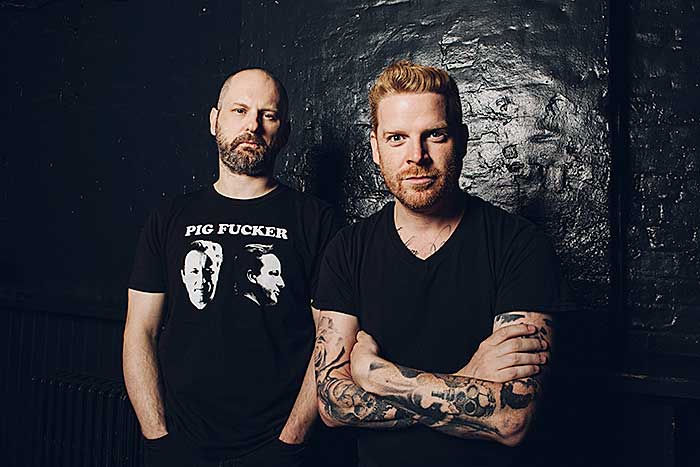
Anaal Nathrakh is nothing if not creative, and you’ve amassed a fairly lengthy and consistent discography of 11 full-length albums. Is this a case of having a lot of ideas flowing all the time? How soon after a recording cycle do you get the itch to start thinking about the next effort?
Yeah, we’re seldom short of ideas. The thing is, we’re apparently quite consistent with the amount of time between our albums, but that’s not by design. That’s why I say apparently. It’s not something we actually knew. It’s something that other people have pointed out to us. We just eventually know that it’s time to make new music. It comes in very intense bursts. So, we knew roughly when we wanted to record for Endarkenment, but we didn’t have much specific feelings about the form it would take until the critical time arrived and the music burst out.
“WE DIDN’T HAVE MUCH SPECIFIC FEELINGS ABOUT THE FORM IT WOULD TAKE UNTIL THE CRITICAL TIME ARRIVED AND THE MUSIC BURST OUT.”
And on the musical side, by which I mean what Mick does, for the most part that will be it until the next boil is lanced. He doesn’t really take a few months or whatever and then slowly start piecing things together. He waits until it’s time and then spews everything out very quickly. I suppose you might trace that back to his dad’s approach to drinking. He always said to us, “You don’t have a couple of drinks a day or every other day. You save it up till the end of the week, go out and have a gallon and a half, then float home!” Perhaps not the healthiest approach, but it’s one that sums Mick’s approach to writing music up quite nicely!
How quickly do albums, particularly Endarkenment, come together from that embryonic period to getting really deep into writing and recording? Do you do a lot of emailing ideas back and forth, or is there a point where you might meet in person and hash out a lot of it at one time? Do you ever have multiple albums worth of material?
In our case, very, very quickly. As in, much more quickly than most people would believe was possible. And Endarkenment was probably the fastest yet. Mick wrote the music in less than a week. That’s not a joke or an exaggeration. And no, we don’t really discuss what we’re doing very much. Usually, until we’re recording I haven’t heard the music, because I don’t want to. I constantly add to my store of lyrics and ideas, and then I wrap those ideas around the music in an instinctive, spontaneous way. I may have the occasional idea that I’ll suggest to Mick that he’ll incorporate. Probably the most recognizable recent one was the guns on “Forward!” but that’s it. And Mick doesn’t really make suggestions to me about lyrics or subject matter. I hardly use an idea unless it means at least two things at once and takes half an hour to explain properly. Not out of willful obscurantism, it’s just the way my head works. So, neither of us is really very collaborative.
“I HARDLY USE AN IDEA UNLESS IT MEANS AT LEAST TWO THINGS AT ONCE AND TAKES HALF AN HOUR TO EXPLAIN PROPERLY.”
But then we get together to record the vocals, and that’s more a matter of working together because Mick will explain how he saw sections working together, or we’ll figure a vocal melody out together and things like that. Having said all that, it’s not like we’re particularly territorial, it’s just that we each do what we’re best at and don’t interfere in what we’re not so good at. And we know we’re on the same page in general, so we each know that what the other does will be something that fits with what we have in mind. For something that’s so compartmentalized, it’s actually almost completely free of ego or anything like that. That’s not to say, however, that we only speak in the studio. We chat via Whatsapp all the time, just not about writing music.
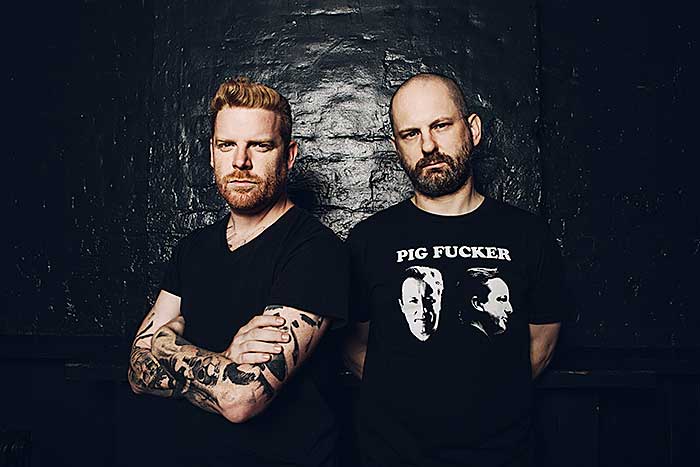
Anaal Nathrakh is so intrinsically linked between the creative relationship between the two of you. At this point, is it effortless, like you can pretty much know what the other is thinking in terms of where a song might go? How would you describe your creative and personal relationship?
Yes, we each pretty much know what the other will do, in broad terms, even if we don’t know the details. But your phrase “at this point” isn’t accurate. It implies “by now” or “after all this time,” when actually it’s the other way around. The reason Anaal Nathrakh is where it is today is because we found it easy to see eye to eye early on, and it’s been that way ever since. I think after the first demo or two, we knew we worked well together and enjoyed doing so with just the two of us. So, there’s no real way Anaal Nathrakh exists other than in the creative relationship between the two of us. That’s what Anaal Nathrakh is.
“THE REASON ANAAL NATHRAKH IS WHERE IT IS TODAY IS BECAUSE WE FOUND IT EASY TO SEE EYE TO EYE EARLY ON, AND IT’S BEEN THAT WAY EVER SINCE.”
Endarkenment builds upon the melodic vocal dynamic that’s been a part of your sound for a while now, dating back to Domine Non Es Dignus (2004). The juxtaposition of the rhythms, riffs, and vocal extremity with those outstanding choruses and guitar melodies is perhaps the strongest it’s ever been here. Vocally, how do you challenge yourself with each release to push forward Anaal Nathrakh, and how did you approach Endarkenment specifically? This album opens things up right from the get-go with the title track—that chorus takes hold and never lets go.
Thanks. Without wanting to be narcissistic, I do think that aspect is particularly strong on Endarkenment. Not that there’s lots more of it, particularly. I’ve had to disagree with a number of interviewers recently when they’ve said this album is much more melodic than our previous albums. But those soaring parts and whatnot are more powerful. But the approach didn’t change. It was, as always, a matter of responding to the music in the way the felt the most right, the most instinctive and satisfying. And I think doing what feels right in your gut when you’re making music translates across to the listener later on. If it felt powerful and right to you at the time you did it, there’s more of a chance it’ll feel the same way to someone else when they experience it. I do always try to include a new “voice” on each album, too, though you may not be able to tell very easily as a listener because so much of it is a cacophony already! (laughs)
Having said that, circumstances did have a part to play on Endarkenment as well. For the previous few months I’d essentially been locked away by myself in front of a computer finishing a huge piece of non-music work. And that meant that aside from speaking to my girlfriend when she got back from work or whatever, I hadn’t really used my voice much at all. So in the build up to recording, I made efforts to strengthen my voice again, but I couldn’t spend hours screaming my head off. I live in a flat, or small apartment as you’d call it, and my neighbors would probably call the police. What I could do, though, was sing-along to the music I was listening to while I worked if it was more “normal.” So, I used that as an opportunity to rebuild some vocal strength, but at the same time I suppose it was practice. I wasn’t doing it with that in mind, but as well as stamina, I think it probably helped with the melodic singing in the studio. Not that the harsh vocals were shit this time around—the same preparation helped there, too. But it might have meant the “normal” singing was in a better place by the time we recorded. I don’t know, I’m probably too close to it all to judge, but it sounds that way to me when I listen back to the album now.
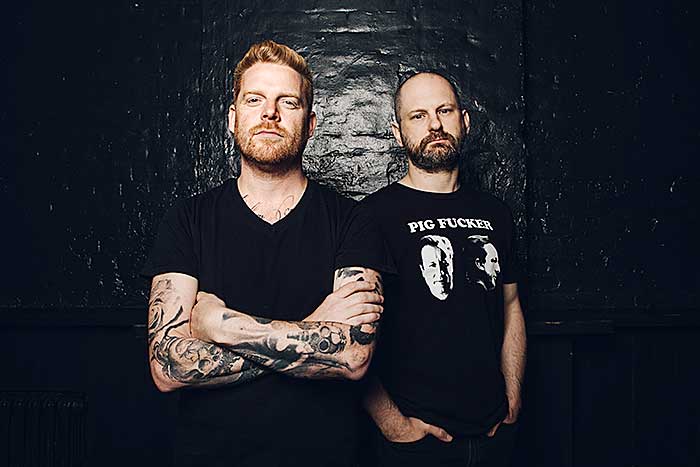
The album title is sort of a play upon the Age of Enlightenment, the abandoning of reason and clear thought and those core values by society today. It’s a clever play on words, and I was wondering if you wouldn’t mind expanding?
Yes, that’s roughly what I had in mind. It seems to me that there’s been a change in the way people relate to one another when they talk about the world. That’s probably clearest in politics, but it’s not strictly about politics. It includes lots of other stuff like identity, religion, wider culture. The change isn’t wholesale, it’s a change of emphasis. It seems to me that there was previously an assumption that discussions and disagreements about many of these topics were based on facts. If the facts didn’t fit what you were saying, you were wrong, and even if you clung to irrational beliefs as a result, that really meant you’d lost the argument. Whereas now it seems more and more that when people talk about these things, they’re expressing feelings, not beliefs about facts.
Rationality and objective truth seem half the time to just get in the way and piss people off. That’s a fundamental move away from Enlightenment principles. And it has some strange effects. For example, it seems less okay now to criticize religious beliefs than it did previously, paradoxically because the people who would want to quiet such criticism think of themselves as enlightened. Yet, however well intentioned those people might be, the overall effect of what I’m calling “endarkenment” is exceedingly ominous, as is seen in the Orwellian, authoritarian actions of those who push “endarkenment” positions. So, for example, the UK government literally stopping democracy, closing parliament because it insisted on being able to vote on things in a way that didn’t suit the government’s plans, citing the “will of the people” as if they were treating Umberto Eco’s diagnostic criteria for nascent fascism as an instruction manual. That was done by the factions who have spoken in the most “endarkenment” terms, if that phrase makes any sense.
“THERE’S A STRONG SENSE THAT THE WORLD IS A DARKER, MORE DANGEROUS PLACE. COLD WARRIORS ABOUND, AND WHERE THE WORLD IS HEADING LOOKS INCREASINGLY DARK, TOO.”
Okay, so they didn’t get away with it for long, but it’s a crystal clear demonstration of where their thought processes are. That’s the theoretical level of the idea of “endarkenment.” But it’s also intended in a more general sense about how the world feels. Maybe there’s a bit of an influence from Yeats’ The Second Coming, which we’ve drawn on before. There’s a strong sense that the world is a darker, more dangerous place. Cold warriors abound, and where the world is heading looks increasingly dark, too. The cares and concerns today are different than in the interbellum world Yeats was reacting to, and hopefully the results will be very different, but I get a very 1930’s feeling sometimes.
The other day my girlfriend heard someone arguing that black mermaids in Disney films were wrong because even though mermaids weren’t real, they were part of “white mythology.” I don’t know where to even start with that, but it gives a sense of what I mean when I say a 1930’s feeling. As a species I worry we’re in the midst of really fucking up again, we just haven’t realized it. The truly Anaal Nathrakh response is to see that as just humanity living down to its nature and showing its true colors once again. But that’s no cause for triumphalism or celebration.
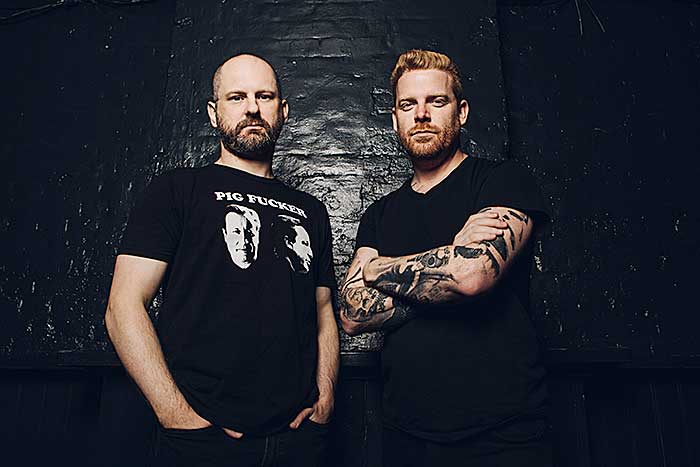
“A Pig with Cocks in Its Eyes” has got to be one of the greatest parenthetical of all time. Many Nathrakh fans have taken great pains in attempting to decipher and write down your lyrics, which aren’t published, since we’re all such great fans of the work you’re putting in every album. How does that make you feel, and has your approach changed much over the years? What other lyricists do you enjoy, and what are your thoughts as to the importance of them within the extreme metal context? After all, some people are just here for the riffs, but others really want to hear what you have to say.
(laughs) What a great accolade, there can’t be many who can boast the greatest parenthetical of all time! The idea that people might pay that much attention is certainly gratifying, albeit a bit surreal. And if they’re trying that hard to decipher them, which isn’t really the point from our perspective, then it likely means they’re thinking for themselves about what’s in the lyrics, which is more the point as far as we see it. At least, that’s part of the point of the lyrical side of Anaal Nathrakh. The real overall point, as you say, is to get something out of listening to music. There’s nothing wrong with being in it for the riffs. Everything else is secondary to that. Even within the lyrical side of it all, we’re not trying to be didactic and teach or tell people anything. We’re more interested in saying, “This is a way of looking at the world. It’s up to you whether you find it compelling and what you think about it.” But it’s interesting to think that there are those out there who take that on board and run with it. The approach hasn’t really changed, but that’s kind of like saying a Model T and a Huayra are both cars. The content might have moved on, but the basic idea of articulating semi-abstract nightmares inspired by the world is still there.
“THE CONTENT MIGHT HAVE MOVED ON, BUT THE BASIC IDEA OF ARTICULATING SEMI-ABSTRACT NIGHTMARES INSPIRED BY THE WORLD IS STILL THERE.”
As for other extreme metal lyricists, I haven’t paid close attention since I was younger, but I’ve enjoyed the unusual perspectives some have. Tomas Lindberg was probably the one who made me realize there could be more going on than horror and a simplistic approach to Satan. There was an At the Gates song drawn from, if memory serves, Native American poetry—“herons on the greenbilled water.” Not that I wanted to copy that, but just realizing that there were more possibilities. Also, La Masquerade Infernale’s more nuanced ruminations on Satan. Dead’s questioning perspective in “Life Eternal,” or even Burzum with “Beholding the Daughters of the Firmament.” I don’t mean these were influences, necessarily, but they introduced me to the idea of different lyrical perspectives in extreme metal. I’d really like to see more from Joe Horvath, but I’m not sure if Circle of Dead Children are still active. Hopefully, they’ll come back.
How would you describe the differences between Anaal Nathrakh the studio band versus Anaal Nathrakh the live band? You play infrequently enough that it retains that mysterious and intense quality that drew fans to the band in the first place. Do you feel that certain album material plays better live than on record, and are there songs that you feel are actually improved with other members on stage, particularly a live drummer?
Well, obviously there’s the difference in personnel. In the studio, there’s just the two of us, plus the occasional collaborator or friend. Whereas live, there’s five of us. So, there’s a different set of personal dynamics, and there’s naturally a physicality and viscerality that is unique to playing live. And that physicality is part of why we wouldn’t want to play live as a duo, even though it’d probably be technically possible. Plus, being in the studio isn’t quite as physically exhausting! (laughs) But yeah, if possible we like to hold on to that atmosphere you suggest by not overdoing it. And yes, there definitely are some tracks that work better live than others. It’s always the case that we’re led by what an album needs. We wouldn’t intentionally make songs that don’t work so well on an album just because we intended to play them live. But you get a feel for what might work, and then you rehearse songs. Sometimes it’s been the case that we thought a song would work well live, but then we rehearsed it and it didn’t quite feel right. Not necessarily because of any specific thing, but just the feel of it. Live music is all about feel, after all. But there are some songs that just work particularly well live. I mentioned “Forward!” earlier, that’s a prime example. It works very well on record, too, as it happens, but live it’s really in its element.
Both of you are no strangers to the stage, of course, with you and Benediction and Mistress and Mick with his other projects. Is Anaal Nathrakh the most personal for you both?
Don’t forget that Mick was in Mistress, too. In fact, I’m not sure what other projects Mick has been on stage with since Mistress, actually. There was Exploder, and the tour he did helping out Bleeding Through, but I’m not sure he’s done much else live apart from Anaal Nathrakh in, what, 10 years? But anyway, yeah, we were both used to playing live before we took Anaal Nathrakh live. And yes, at least for me, Anaal Nathrakh has been the most personal of them all, at least since Mistress ended. That’s not to devalue Benediction in any way at all. I just mean that Benediction existed before I joined, and so I wasn’t part of creating its fundamental identity in the same way as Anaal Nathrakh. I would imagine Mick would think something similar. He’s one of the least rigid people you’ll meet, and he’s always had a wide range of ideas and things he’s involved in. But Anaal Nathrakh has been his primary, or at least best known output for most of his adult life. So, although we’ve both been involved in many other things, it’s inevitable that there’d be a personal aspect that’s unique to Anaal Nathrakh.
“ALTHOUGH WE’VE BOTH BEEN INVOLVED IN MANY OTHER THINGS, IT’S INEVITABLE THAT THERE’D BE A PERSONAL ASPECT THAT’S UNIQUE TO ANAAL NATHRAKH.”
The consumption of music is very different now. Is track order still something that’s important to you, for those of us who listen to an album front to back? “Requiem” definitely feels like a send-off piece with that melodic guitar outro.
Oh yeah, definitely. An album has to have a flow and the right juxtaposition of the various elements. And maybe you’ll start out with a rough idea from the way the first bones of the songs sound, but you still need to check and change or tweak. For Endarkenment, things fell into a rough order quite naturally, but then we moved a song or two around to balance things properly. “Requiem” was always going to be the last track, though. It was intended as a closer right from when it was first written. But that’s been the case before, and we’ve still changed things. You can always take what was intended as an introductory part or ending part and move it to another song, so long as you can make it fit correctly. Well, not always, but the option is sometimes there, it’s just a part of songwriting. “Requiem” closes the album just as it was always intended to, and the flow of the rest of the songs only required a couple of tweaks from where we first thought it might be. As ever with us, it’s all about instinct and feel.




















